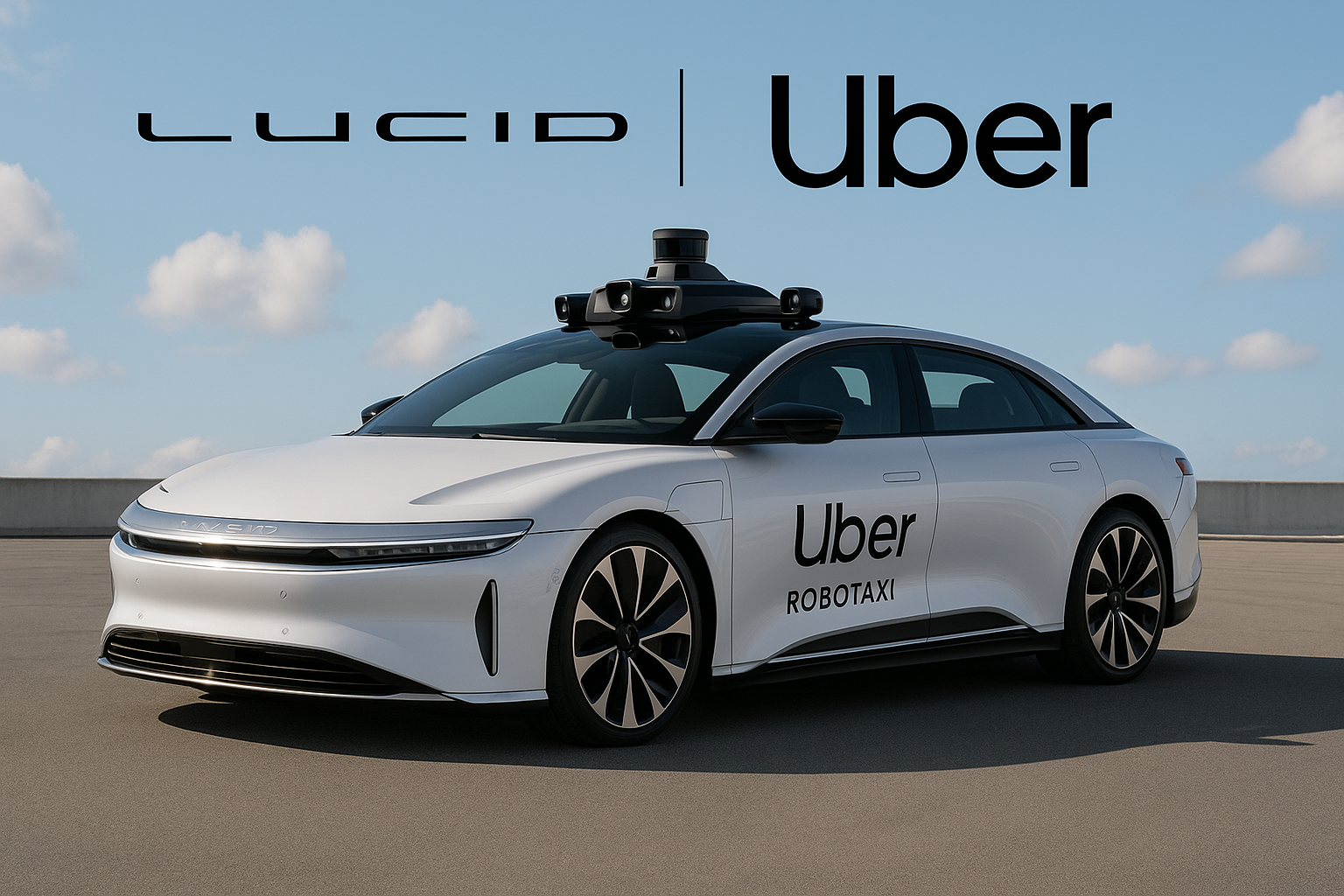
Lucid Group’s (NASDAQ:LCID) stock has surged on news that the electric vehicle (EV) innovator is making a high-stakes move into the autonomous robotaxi space—a sector that’s quickly becoming a battleground for tech titans and legacy automakers alike. The latest catalyst: Lucid has unveiled a landmark partnership with Uber, one of the world’s largest ride-hailing platforms, propelling the company into the global spotlight as a major new contender in self-driving mobility.
From Luxury EVs to Autonomous Ambitions
Lucid first earned headlines as a challenger to Tesla, building a reputation on its ultra-premium Lucid Air sedan, which boasts leading battery technology and record-setting range. The company has spent years developing its in-house powertrain and software systems, targeting the high end of the EV market with an emphasis on performance, range, and luxury.
Now, Lucid is set to expand its ambitions far beyond private vehicle sales. By announcing a strategic partnership with Uber, combined with a major autonomous vehicle technology provider, Lucid is officially entering the autonomous taxi race. This move aims to capitalize on the projected multi-billion-dollar robotaxi industry, where companies like Waymo, Cruise, and Tesla are already jockeying for position.
The Uber Robotaxi Partnership
According to the latest filings and company statements, Lucid’s partnership with Uber will see the development and deployment of a new fleet of self-driving Lucid vehicles designed specifically for Uber’s ride-hailing network in select U.S. cities. Lucid will leverage its advanced electric powertrains and next-generation vehicle architecture, while its technology partner provides the autonomous driving stack, including sensors, AI-driven decision-making, and connectivity.
The initial phase will launch pilot programs in urban markets such as San Francisco, Los Angeles, and Miami. Passengers in these cities could soon hail a fully electric, self-driving Lucid through the Uber app, experiencing a blend of luxury and cutting-edge autonomy. The goal: position Lucid as a technology-forward brand not just in luxury EVs, but in the future of urban mobility, where shared autonomous vehicles could soon dominate city streets.
Market Reaction: LCID Soars
The market has responded with enthusiasm. Shares of Lucid (NASDAQ:LCID) jumped sharply on the Uber partnership news, reflecting investor optimism about the potential for new revenue streams and the company’s ability to compete in a sector forecasted to reach hundreds of billions in annual revenues by the end of the decade. The move is seen as a key catalyst for the stock, which had struggled in recent quarters amid intense competition and the capital-intensive nature of the EV business.
Investors are betting that Lucid’s distinctive technology, established manufacturing base in the U.S., and new relationship with Uber will give it an edge as cities and fleet operators seek reliable, high-performance autonomous vehicles for commercial fleets.
Financial Implications and Growth Potential
For Lucid, the robotaxi partnership with Uber could provide several critical benefits:
- Access to Uber’s Massive Customer Base: With millions of riders globally, Uber provides an instant platform for scaling Lucid’s autonomous fleet.
- Recurring Revenue Model: Unlike one-time vehicle sales, robotaxi fleets generate ongoing revenue through ride-hailing services, data monetization, and software upgrades.
- Higher Utilization: Autonomous taxis are used more intensively than privately owned cars, increasing the value derived from each vehicle produced.
- Technology Validation: Success in the Uber network could cement Lucid’s reputation as a cutting-edge technology player, potentially unlocking further partnerships or licensing deals.
The financial upside is considerable if Lucid can scale its autonomous taxi business. Analysts suggest the addressable market for robotaxis could reach $500 billion globally by 2030. Even capturing a small share of this market through Uber would materially impact Lucid’s top line, helping the company achieve profitability faster than relying on luxury car sales alone.
Competitive Landscape and Risks
Lucid is entering a fiercely competitive field. Tesla, Alphabet’s Waymo, GM’s Cruise, and Chinese players like Baidu are all pouring billions into autonomous technology and pilot deployments. Uber itself has experimented with autonomous taxis in the past, but Lucid’s luxury vehicles and advanced engineering could provide a unique value proposition for the ride-hailing giant’s premium services.
Still, technological and safety challenges loom large. While Lucid’s engineering talent and software expertise offer a strong foundation, real-world deployment at scale requires vast data, robust safety validation, and close cooperation with local governments. Regulatory hurdles and public acceptance will be key factors in determining how quickly the Uber-Lucid robotaxi project can expand.
Strategic Outlook
Despite the risks, Lucid’s robotaxi pivot in partnership with Uber aligns perfectly with industry trends toward shared, electric, and autonomous transportation. As cities push for cleaner, more efficient mobility solutions, partnerships between automakers, tech firms, and platform providers like Uber are set to drive the next phase of urban transportation innovation.
If Lucid can successfully transition from luxury EV maker to a leader in the robotaxi space, leveraging Uber’s scale and market reach, it may unlock massive long-term shareholder value and secure its place at the forefront of mobility’s autonomous future.
Disclaimer:
This article is for informational purposes only and does not constitute investment advice. Investors should conduct their own research or consult with a financial advisor before making investment decisions.
